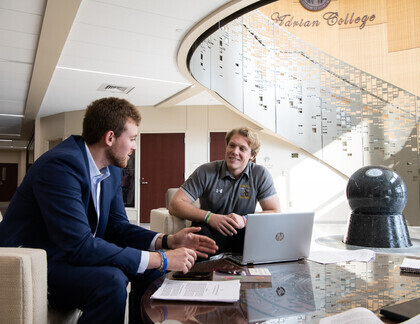Why 丝瓜视频?
Whatever your background, 丝瓜视频 can provide you with the skills and experience you need to realize your dreams.

Why 丝瓜视频?
Whatever your background, 丝瓜视频 can provide you with the skills and experience you need to realize your dreams.

Undergraduate Studies
We offer an undergraduate program of study that鈥檚 small enough to be personal

Graduate Studies
Pursuing your dream career starts with the next phase of your education. When you enroll in graduate school at 丝瓜视频, you鈥檙e beginning more than advanced training in your field; you鈥檙e accelerating your professional journey.
CS529 Advanced Systems Programming (3): The course focuses on advanced software development techniques for systems programming across several platforms. Topics covered include the Linux operating system, shell scripting and programming, process control, process communication (peer to peer and client-server), multi-process programming, multi-threading. Pre-requisites: Graduate student status or permission of the Department.
CS541 Advanced Topics in Data Structures and Algorithms (3): This course covers methodologies for developing efficient algorithms. Some advanced and specialized data structures such as R-trees and their variations, including Hilbert R-trees, X-trees, and graphs, will be presented along with their associated algorithms (traversal, insertion, deletion). Pre-requisites: Graduate student status or permission of the Department.
CS543 Advanced Topics in Optimization (3): This course covers the major global optimization algorithms and their application in engineering. The topics covered include evolutionary algorithms, genetic algorithms, hill climbing, simulated annealing, and learning classifiers. Pre-requisites: Graduate student status or permission of the Department.
CS545 Advanced Concepts in Computer Science (3): The course explores advanced topics in algorithm design and analysis, programming techniques, data structures, languages, compilers, translators, regular expressions, grammars, and computing complexity. Pre-requisites: Graduate student status or permission of the Department.
CS552 Advanced Software Engineering (3): This course provides the students with industry practices and prepares them to integrate medium to large-scale software development projects. The course revisits the software development models and exposes the students to software design patterns emphasizing their practical application in software analysis and design methodology, implementation techniques, and system development paradigms. The course covers all aspects of software engineering, including testing and verification, ensuring students are well-equipped to deliver high-quality and reliable software. The course also covers process documentation related to specific standards (IEEE, DO178, CENELEC). Pre- requisites: Graduate student status or permission of the Department.
CS570 Digital Signal Processing (3): This course covers Analysis of discrete-time linear-time-invariant (LTI)systems in the time domain and frequency domain. The course covers discrete-time signals and systems. The main topics include discrete-time Fourier transform and the fast Fourier transform, Z-transform, and filter design. Examples of the application to digital signal processing will also be shown. Pre-requisites: Graduate student status or permission of the Department.
CS573 Pattern Recognition (3): This course introduces students to pattern recognition (Bayesian learning, linear methods, support vector machines, kernels, feature extraction, feature selection, clustering, regularization, and neural networks). Applications in computer vision and networks may be discussed and include image segmentation, object measurement, and classification and estimation. Pre-requisites: Graduate student status or permission of the Department.
CS574 Advanced Topics in Deep Learning and ANN (3): The course revisits the fundamentals of artificial neural networks, ANN architectures, and learning algorithms. Supervised and unsupervised learning algorithms will be explored. The course extends to deep learning models. Pre- requisites: Graduate student status or permission of the Department.
CS575 Advanced Topics in Digital Image Processing (3): This course exposes the students to advanced image processing material. Topics covered include histogram equalization and processing, point operations, algebraic operations, geometric operations, filter design, processing of sampled data, image restoration, and image compression. The course also covers mathematical morphology operators and their usage in image processing. Pre-requisites: Graduate student status or permission of the Department.
CS578 Advanced Topics in Computer Vision (3): This course covers some advanced topics in computer vision, such as stereo correspondence, motion estimation, 3D reconstruction, shape from shading, structure from motion, and face detection. Vision transformers architectures will also be covered. Pre-requisites: Graduate student status or permission of the Department.
CS581 Advanced Database Design (3): The course covers advanced topics in database design. It revisits 3rd normal form and Boyce-Codd NF, and tackles 4th and 5th normal forms; data models and the SQL query languages along with its variants such as Oracle SQL and procedural version PL/SQL will also be presented. Other topics covered include the physical level, indexing, transaction management, concurrency control, recovery procedures (roll-backs). Pre-requisites: Graduate student status or permission of the Department.
CS591 Applied Research I – Project (3): This course is the first part of a two-course sequence; students will work under the guidance of a faculty member on a specific project that will prepare them for developing real software systems. This course contributes to improving students’ technical skills. Students are required to present their work when completed. This first course focuses on reading related literature and starting conceptual design. Pre-requisites: Graduate student status or permission of the Department.
CS592 Applied Research II – Project (3): This course is the second part of a two-course sequence; students will work under the guidance of a faculty member on a specific project that will prepare them for developing real software systems. This course contributes to improving students’ technical skills. Students are required to present their work when completed. This second course focuses on implementing the design, testing, experimenting, and drafting a research report. Pre-requisites: Graduate student status or permission of the Department.